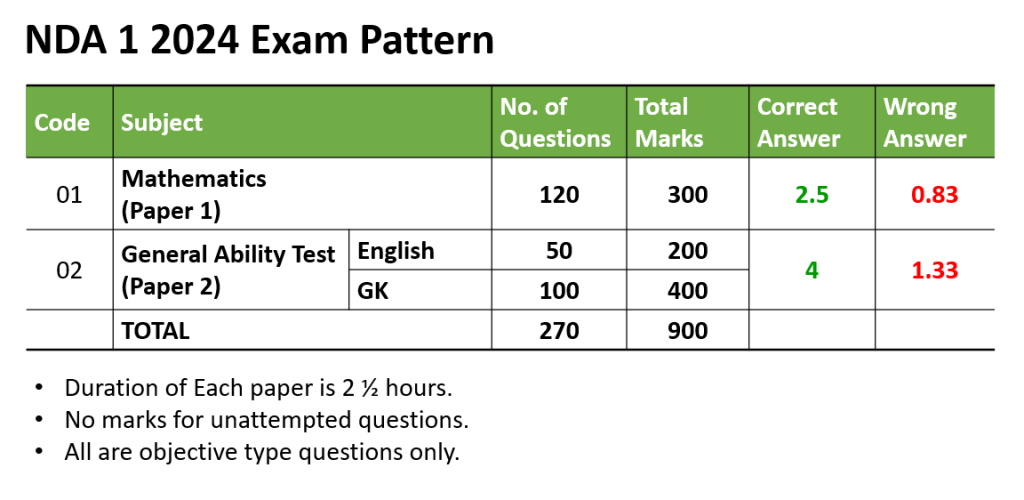The National Defence Academy (NDA) is one of India’s most prestigious defense exams, offering a coveted pathway to a career in the Indian Armed Forces. While the exam covers a wide range of subjects, mathematics is often perceived as a significant hurdle, particularly for students from non-mathematics backgrounds. However, this perception is largely a myth, and with the right approach and dedication, non-maths students can excel in the NDA exam.
In this comprehensive guide, we will explore the strategies and techniques that non-maths students can employ to tackle the NDA exam successfully. We will delve into the Smart Strategies for Non-Maths Students to Clear NDA Exam, unpack the key focus areas in the mathematics section, and discuss effective preparation methods to compensate for weaker areas. Additionally, we will highlight the importance of the General Ability Test (GAT) and provide valuable insights on how non-maths students can leverage their strengths in this section.
Also Read | NDA Exam Date 2025 – Check NDA 1 2025 and NDA 2 2025 Exam Dates
1. Understanding the NDA Exam Structure
The NDA exam consists of two written papers:
- Mathematics (300 marks)
- General Ability Test (GAT) (600 marks)
The Mathematics paper covers topics up to the 12th-grade level, while the GAT paper assesses candidates’ proficiency in English, general knowledge, current affairs, and various science subjects.
It’s important to note that while the Mathematics paper is mandatory for all candidates, including those from non-maths backgrounds, the eligibility criteria for the Air Force and Navy wings require mathematics as a subject at the 10+2 level. However, for the Army wing, candidates can apply irrespective of their academic stream, provided they meet the overall eligibility criteria.
2. Tackling the Mathematics Section
Focus on Fundamental Concepts
Non-maths students should start by revising the basic concepts and principles of topics like algebra, trigonometry, geometry, and arithmetic. Understanding the core ideas before delving into complex problems is crucial for building a strong foundation.
Prioritize Important Topics
Not all mathematics topics carry equal weightage in the NDA exam. By focusing on high-priority areas like algebra, trigonometry, and geometry, non-maths students can maximize their chances of scoring well in the Mathematics paper.
Utilize NCERT Resources
For non-maths students, the NCERT mathematics books from classes 9 to 12 serve as an excellent starting point. These textbooks provide clear explanations and are well-aligned with the NDA exam syllabus.
Practice Previous Year Question Papers
Solving previous year question papers will help non-maths students familiarize themselves with the exam pattern, understand the types of questions asked, and improve their speed and accuracy in problem-solving.
Learn Shortcuts and Tricks
Mastering mathematical shortcuts and tricks can significantly boost the efficiency of non-maths students in solving problems during the exam. This approach can save valuable time and allow them to approach complex questions with confidence.
Seek Guidance from Experts
Enrolling in a reputable coaching institute or seeking guidance from experienced mentors can provide non-maths students with invaluable insights, personalized feedback, and effective strategies for tackling the Mathematics section.
3. Excelling in the General Ability Test (GAT)
The GAT paper carries a substantial weightage of 600 marks, making it an excellent opportunity for non-maths students to showcase their strengths and compensate for any weaknesses in the Mathematics section.
English Preparation
The English section in the GAT paper includes questions on grammar, comprehension, vocabulary, and sentence structure. Non-maths students can focus on improving their English proficiency by reading newspapers, practicing grammar exercises, and enhancing their reading comprehension skills.
General Knowledge Preparation
The GK section covers a wide range of topics, including science, current affairs, history, geography, and politics. Non-maths students can leverage their general awareness and stay updated on national and international events by regularly reading newspapers and following reliable online sources.
Science and Reasoning
While the science topics in the GAT may seem daunting for non-science students, focusing on the fundamental concepts covered in school textbooks can help them perform well in this section. Additionally, practicing logical and analytical reasoning exercises can improve their problem-solving abilities.
Time Management and Study Plan
Developing an effective study plan is crucial for non-maths students. Allocate more time for subjects where you feel weaker, such as mathematics, while ensuring you revise other subjects regularly. Incorporate mock tests and practice sessions to assess your progress and identify areas for improvement.
Also Read | 9 Tips to Crack NDA 1 2025 Exam
4. Leveraging Strengths and Overcoming Weaknesses
Non-maths students possess unique strengths that can be leveraged to excel in the NDA exam. While mathematics may be a challenge, they can capitalize on their proficiency in subjects like English, general knowledge, and reasoning to secure high scores in the GAT section.
By adopting a strategic and well-rounded approach, non-maths students can overcome the perceived disadvantage and emerge as successful candidates in the NDA exam. The key lies in recognizing and harnessing their inherent abilities, coupled with a dedicated and systematic preparation plan.
Success Stories of Non-Maths Students
The NDA exam has witnessed numerous success stories of candidates from non-maths backgrounds who have excelled in the selection process. These individuals have proven that a strong foundation in mathematics is not the sole determinant of success in the NDA exam.
Through their exceptional performance in the GAT sections, effective time management, and demonstration of leadership qualities during the interview process, these candidates have shattered the myth that only math students can thrive in the NDA exam.
Also Read | NDA Selection Process 2024: Written Exam & SSB Interview
Conclusion
The NDA exam is a prestigious gateway to a fulfilling career in the Indian Armed Forces, and it is open to students from diverse academic backgrounds, including those without a strong mathematics foundation. By adopting a strategic and well-rounded approach, non-maths students can overcome the challenges posed by the Mathematics section and leverage their strengths in the GAT to achieve their aspirations.
With dedication, consistent effort, and the right guidance, non-maths students can excel in the NDA exam and embark on a rewarding journey of serving the nation. Remember, the path to success is not defined by your academic stream, but by your determination, adaptability, and the ability to recognize and capitalize on your unique strengths.
FAQs
1. Can a non-math student apply for the NDA exam?
Yes, non-math students can apply for the NDA exam, particularly for the Army wing, as mathematics is not a mandatory subject at the 10+2 level for this entry.
2. What is the cut-off for the Mathematics section in the NDA exam?
The cut-off for the Mathematics section in the NDA exam can vary between 20% to 30%, with the previous few years seeing a cut-off of around 25%.
3. How can non-math students tackle the Mathematics section?
Non-math students can focus on revising fundamental concepts, prioritizing important topics, utilizing NCERT resources, practicing previous year question papers, learning shortcuts and tricks, and seeking guidance from experts.
4. What is the importance of the General Ability Test (GAT) for non-math students?
The GAT section, which covers English, general knowledge, science, and reasoning, provides an excellent opportunity for non-math students to showcase their strengths and compensate for any weaknesses in the Mathematics section.
5. Can non-math students from the arts or commerce stream join the NDA?
Yes, non-math students from the arts or commerce stream can apply for the NDA exam, particularly for the Army wing, as mathematics is not a mandatory subject for this entry.












